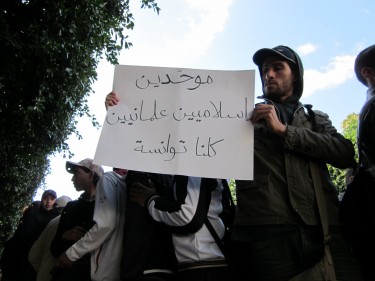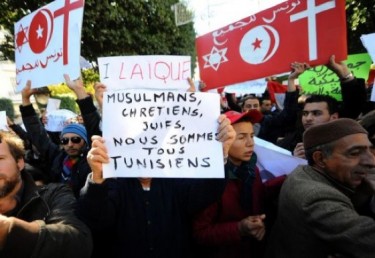This post is part of our special coverage Tunisia Revolution 2011.
Although Tunisia is a country with a large Muslim majority and the Tunisian Constitution states that Islam is the state religion, Tunisian society is one of the most secular in the Muslim world.
The secularization movement goes back to the post-independence era under the presidency of Habib Bourguiba, one of the most secular leaders in the Arab world. Bourguiba is mostly known for the major role he played to issue “Le Code du Statut Personnel” or the Personal Status Law, a set of laws that mainly protected women and guaranteed their rights. During his 23-year rule, his successor Zine Al Abideen Ben Ali continued the secularization movement.
However, Bourguiba and his successor Ben Ali (now deposed) have been criticized for being too harsh not only on political Islamist parties and leaders, but also on ordinary Tunisians who wanted to freely practice a number of religious activities.
During the past 50 years or so, women were banned from wearing headscarves, and the secret police used to keep an eye on and investigate those who prayed in mosques. In other words, secularism and religious freedom at that time were only working for the benefit of those who did not want to practice religion, but those who wanted to do so were treated with suspicion.
After the revolution, secularism and the place of Islam have been the centre of heated debates on social media platforms and Tunisian blogs.
‘Made in Tunisia’ secularism:
Liberté Conditionnelle, a Tunisian blogger, is a supporter of “a Secular Tunisia, but its secularism should be Tunisian.” Liberté Conditionnelle explains [ar]:
تونس الغد من اولوياتها ضمان الحريات الشخصية لكل المواطنين كل انسان حر في معتقداته و له الحرية المطلقة في ممارستها … لذا فالتونس العلمانيه هي الضمان و الكفيل الوحيد لهذه الحريات ! العلمانية نعم و لكن لا و ألف لا لإستنساخ الأمثلة و تطبيقها حرفيا و بكل “بهامة” (سامحوني في الكلمة) تونس و كما سبق صنعت ثورتها دون الإستناد في ذلك لأي إديولوجية الثورة التونسية فريده من نوعها الثورة التونسية صنعت مفهوما جديدا لمعنى الثورة فهي ثورة سلمية لا قائد له … فعلى الثورة إكمال مسارها و صنع مفاهيم جديدة .و من اهم المفاهيم التي يجب ان تكون تونسية بحته هو مفهوم اللائيكية
Selim also talks about a Tunisian secularism. He writes [fr]:
Pour que la liberté des uns n’entrave pas celle des autres, parlons de la démocratie. Ou soyons plus précis et parlons de la « laïcité ». Non pas la laïcité française ou turque, mais notre laïcité en tant que tunisiens.
He carries on explaining what a “secular Tunisia” is:
C’est une Tunisie qui ne donnerait pas à un politicien le droit de diriger le pays au nom de la volonté de Dieu. La religion ferait partie de la vie privée.
Ainsi, d’un côté, les lois ne sont pas une interprétation des textes religieux, afin de garantir l’égalité entre tous les citoyens quelles que soient leurs croyances.
Et de l’autre côté, les lois ne peuvent pas interdire à un croyant de pratiquer sa religion.
Le port de voile à titre d’exemple ne peut pas être interdit dans une Tunisie laïque.
It is a Tunisia that will not give politicians the right to govern the country on behalf of the will of God. Religion will be part of one's private life.
Thus, laws will not originate from the interpretation of religious texts, in order to guarantee equality for all citizens regardless of their beliefs.
At the same time, laws can't prohibit a believer from practicing his or her religion.
For instance, wearing headscarves can't be prohibited in a secular Tunisia.
A divided Tunisia:
The debate about secularism has deeply divided Tunisia into two segments. One sector considers laicism as the only guarantee for individual rights and liberties while the other views laicism as a threat to the Islamic Tunisian identity.
Amane writes [fr]:
La laïcité […] est une idéologie dangereuse dont les conséquences implicites conduit à une destruction massive de l'identité Islamique de notre Tunisie et la rupture complète avec son passé islamique.
Primavera adds [fr]:
Mes amis si votre laïcité ne signifiait que : liberté, égalité, respect et tolérance alors il n'y a pas plus laïque que l'islam (…)le principe fondamental de la laïcité (vous le connaissez bien) c'est de séparer l'Etat de la Religion, c'est-à-dire vous passer des lois divines et inventer les vôtres humaines avec toutes les imperfections et les défauts…

Banner reads: "United, Islamists and Seculars. We are all Tunisians". Photo by Afef Abrougui from Flickr, used with permission.
Hedi Attia, a blogger for group blog Nawaat, says [fr]:
A propos de la laïcité, elle est à la fois diabolisée par ses adversaires et idéalisée par plusieurs de ses partisans. Personnellement je me considère comme étant un laïc dans le sens où je souhaite une société où toutes les religions et toutes les tendances puissent vivre librement sans que personne n’impose à l’autre son point de vue ou sa manière de vivre.
Juriste Tunisie [fr] argues that the debate has deeply divided the North African country:
Le débat qui devrait être un débat autour du concept d’Etat à choisir est vite devenu un débat d’accusation: Les laïques sont accusés d’être anti-islamistes (voir même athées), les anti laïcité sont accusés d’être des extrémistes et anti-liberté!!!
Pire et encore plus dangereux et inquiétant, on a le sentiment que le débat se déroule entre Pro Nahdha et Anti Nahdha excluant par la même tout le reste des composantes de ce pays.
Plus catastrophique: une grande ignorance règne à propos du concept même de laïcité.
The debate which was supposed to be a debate about the concept of the kind of state that we want, has quickly turned into a debate of accusations: Seculars are accused of being anti-Islamists (even atheists), and anti-laicists are accused of being extremists and opponents of freedom!!!
What's even worse, more dangerous, and disturbing is that we have the impression that the debate is between pro Nahdha and anti-Nahdha and therefore excludes the remaining groups of the country [Nahdha is a Tunisian Islamist Party previously banned under the regime of Ben Ali].
More catastrophic: much ignorance about the term “laicism”
This post is part of our special coverage Tunisia Revolution 2011.








2 comments